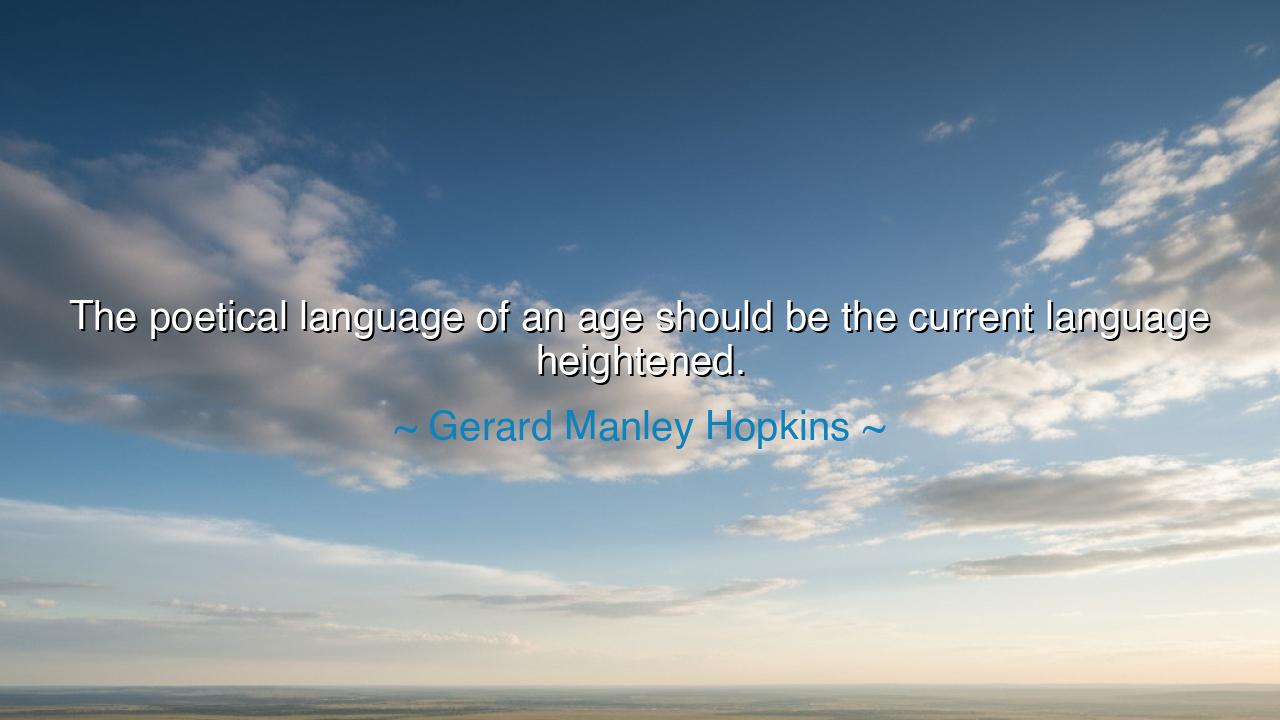
The poetical language of an age should be the current language






"The poetical language of an age should be the current language heightened." These words, spoken by the revered Gerard Manley Hopkins, ring with the profound wisdom of an age-old truth: that the art of poetry does not stand apart from the world, but rather emerges from it, lifting the language of the people to new heights. Poetry is not some foreign or distant language, but the soul of an era given voice, a reflection of the language spoken by those who live in it. It is the current language—the words we speak every day—magnified and shaped by the passion, the intensity, and the unique spirit of the time. Hopkins calls upon us to see that poetry is not an escape from the world, but a deeper engagement with it, a way to take the familiar and transform it into something extraordinary.
To understand the essence of Hopkins' idea, one must look to the poets of the past, those who have shaped the language of their age with a powerful hand. Consider the great Homer, whose epic tales of heroism and divinity were not written in some mystical tongue, but in the common language of his time. Yet, through the magic of his words, Homer turned that very language into a medium of the gods, a timeless vehicle for stories that would resonate across millennia. His poetry was not an otherworldly tongue, but a voice that emerged from the pulse of human experience—the fears, the loves, the struggles, and the triumphs of the people he spoke to.
Similarly, William Shakespeare used the English tongue not as a tool of simple conversation, but as a vessel for profound ideas, emotions, and visions. He took the common speech of his time and heightened it, giving it a grandeur and depth that still echoes through the centuries. His words were not foreign or inaccessible but were made to sing with the beauty of a language that is at once familiar and yet elevated, capable of conveying the full range of the human condition. Shakespeare exemplifies the power of poetry to elevate the everyday, to take the ordinary and make it extraordinary.
In the same way, Hopkins sought to elevate the current language of his time, taking the rhythms and sounds of Victorian England and transforming them into something resplendent. His poetry was deeply rooted in the realities of his age, yet it was capable of giving voice to the ineffable, to the mystical and the divine. His unique use of sprung rhythm and his vivid, sensory language made the words of his day seem like a vibrant, pulsating force—alive with the richness of the world. Hopkins' language was not an escape from reality, but a celebration of it, an attempt to show that the world itself, in all its beauty and ugliness, can be made into something sublime through the power of words.
This insight, however, goes beyond the realm of poetry. It speaks to the way in which language, in its most elemental form, is the expression of the soul of an age. The words we use every day—the phrases we speak, the idioms we share—are a reflection of our collective consciousness, our hopes, our fears, our triumphs, and our failings. The poet’s task is not to create a separate, distant language, but to heighten the language of their time, to magnify the essence of the world around them. This is the power of poetry: it is a mirror held up to society, showing it not as it is, but as it might be in its highest, most beautiful form.
The lesson here is simple but profound: our language, our words, are sacred. They are not mere tools for communication; they are vessels of meaning, capable of transforming the way we see the world. Like Hopkins, we must learn to see the beauty in the language of our time, to elevate it and make it more than what it seems. Whether through poetry, through speech, or through our actions, we are called to take the ordinary and make it extraordinary—to find in the common the seeds of the sublime.
In practical terms, this means embracing the language of your own time, not as something limited or mundane, but as a powerful tool for creating meaning. Whether you are a poet, a writer, or simply a person speaking to another, elevate your words. Speak with intention. Find the extraordinary in the everyday. Just as Hopkins took the common speech of his age and made it sing with beauty and grace, so too can we use the language of our time to express the highest ideals of humanity. Speak not only to be understood but to elevate those who hear you, to transform the world around you with the power of words.






AAdministratorAdministrator
Welcome, honored guests. Please leave a comment, we will respond soon